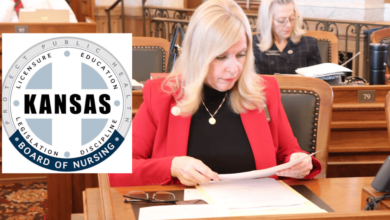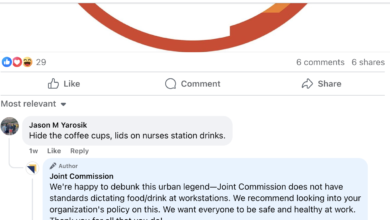Ward manager denies favouring Letby but admits failings

The manager of the unit in which former nurse Lucy Letby murdered seven children has denied giving her preferential treatment – but admitted she should have acted sooner.
Letby, 34, is serving multiple whole-life orders in prison for the murder of seven babies, and attempted murder of seven others, between June 2015 and June 2016 at the Countess of Chester Hospital.
“I just don’t expect people to behave that way”
Eirian Powell
Eirian Powell, the hospital’s neonatal ward manager and a nurse at the time of the murders, was questioned yesterday at the Thirlwall Inquiry, which is investigating how Letby was able to commit her crimes.
As ward manager, Ms Powell – who retired in 2017 – had oversight of the unit on which Letby worked and was one of her direct superiors.
Counsel to the inquiry Rachel Langdale KC questioned Ms Powell on her actions regarding Letby, both in the 2015-16 period and in the years prior.
When Ms Powell was questioned by police following Letby’s arrest, she described her as “the crème de la crème” of nursing students who were recruited to the trust.
Ms Langdale asked Ms Powell about the use of this phrase, and why she had repeatedly told people in meetings in 2016 that Letby’s record was clean, with no errors or complaints about her performance.
The inquiry heard how there were two incidents the nurse manager knew of at that stage, where Letby had broken rules or lapsed in her practice.
The first, the inquiry heard, was a near-miss incident in 2013, where Letby almost gave a baby a lethal dosage of morphine.
The other was the period preceding Child C’s death, where Letby had ignored her own allocated child to spend time with Child C and “intrude” – as Ms Langdale had described it – on the parents’ grief.
This latter incident, in which Letby disregarded ward rules to attend to a baby which she not have been caring for, led to the child she was meant to look after deteriorating.
When this happened, the shift leader – known to the inquiry as Nurse W – complained to Ms Powell about it and aired concerns about Letby’s behaviour.
Ms Langdale asked: “You say [in a meeting in May 2016] there were no performance issues or complaints about her performance. Nurse W had complained about her performance…
“Did you forget that when you wrote [the meeting notes]?”
Ms Powell replied: “Well, that was one incident.”
Ms Langdale pressed Ms Powell further, and the former nurse manager conceded that it was “an oversight”.
The inquiry heard how, by autumn 2015, Ms Powell began tracking deaths, and some collapses, on the neonatal unit and that she produced a chart which pointed to Letby being a commonality.
However, quizzed on why she did not contact the police, she told the inquiry: “Well, nothing changed as far as evidence was concerned, nobody saw anything, nobody heard anything, nothing changed in any of the information at the time.”
She agreed that, by this stage, calling the police should have been an option she had considered.
However, she told the inquiry that she thought that Dr Stephen Brearey, as the lead neonatal clinician and one of the doctors with concerns with Letby, should have been the person to contact police.
Further pressed as to why she did not do it herself, Ms Powell said: “All I could go with is commonality and the high mortality… I’m not sure what they would have done with that, but I guess the police is a good way to have gone because they would do their own investigation.”
Peter Skelton KC, representing some of the families of the babies Letby murdered, put it to Ms Powell that she had failed to investigate the deaths and missed key signs early on which could have allowed the murderer to be caught earlier.
He pointed to the Beverley Allitt case, which Ms Powell said she would have been aware of at the time, and asked why, by early 2016, in the face of the consultants’ suspicion of Letby, she refused to believe she may have been harming the babies.
Ms Powell said: “I just don’t expect people to behave that way.”
Mr Skelton replied: “Of course not. Hardly anyone does. But that’s the whole point of the Allitt recommendation – that someone might do and to identify that person in circumstances where the other possible factors have been excluded.
“The key, Ms Powell, was that you had senior doctors coming to you with concerns and they couldn’t find medical causes for these children’s deaths, but they had found a common factor. That should have been enough to make you suspicious that the babies were being harmed, should it?”
The former ward manager replied: “On reflection, yes.”
“There was no one on the unit I favoured, that wasn’t part of who I am”
Eirian Powell
Mr Skelton asked Ms Powell if she had “dismissed” the possibility of the babies being murdered and, if so, how she could have done so without investigating the deaths fully.
She replied: “We considered it yes, and we said it can’t possibly be, it must be a commonality.”
Ms Powell, asked why she was expecting “obvious” signs of a murder, claimed that it was “difficult to do anything secretly” on a neonatal ward unit.
To which Mr Skelton said: “It actually isn’t. These babies were murdered and no one noticed. You were not in a position, were you, to rule out the possibility that they were murdered, and to rule out Lucy Letby’s involvement in the murder, were you?”
Ms Powell conceded that she was not, and Mr Skelton added: “The fact is, you did not need to take a position [for or against Letby] as a manager, did you?
“You could have simply said: ‘This is an extremely serious allegation. My babies, who I am responsible for as a manager and a nurse, many have been harmed. I need to ensure they and their families get the answers they need. I need to make sure they are safe.’
“That was your responsibility. If you couldn’t exclude that possibility, you failed in that responsibility, didn’t you?”
A very visibly upset Ms Powell agreed with the lawyer’s assertion.
Richard Baker KC, representing another group of families whose children were killed or harmed, asked Ms Powell about accusations from other nurses at the inquiry that she played favourites in the ward and that this clouded her judgment dealing with Letby.
Ms Powell said: “I didn’t have favourites at all… there was no one on the unit I favoured, that wasn’t part of who I am.
“I think that’s very unfair.”
The inquiry heard how Ms Powell had said, in 2016, that the consultants had been “brainwashed” into thinking Letby was a murderer.
Mr Baker suggested that it proved there were “battle lines” between doctors and nurses at the hospital.
Ms Powell said: “No, not really. It was just there was double standards.
“The doctors were treated differently to nurses. We were told we couldn’t do certain things, doctors did them and actually carried on doing it.”
She said overall nurses and doctors had a “good relationship” but added that the consultants “had their moments where they were allowed to scream and shout at the staff and it was accepted”.
The inquiry continues.
More from the Thirlwall Inquiry







